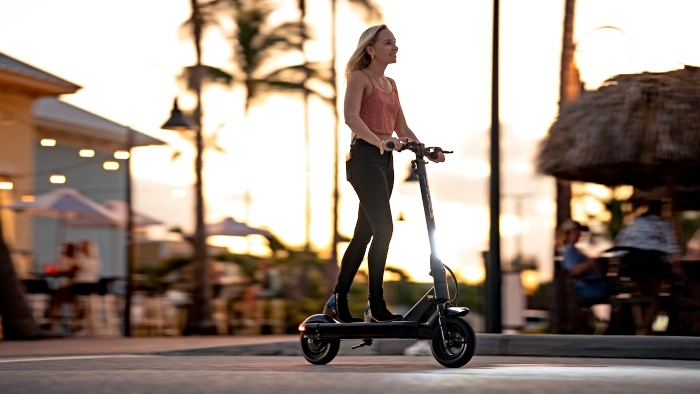
The Cheshire Police Crime Commissioner has warned anyone riding a privately-owned e-scooter on the roads or in a public space faces having the vehicle seized, writes Belinda Ryan.
E-scooters are classed as motor vehicles and riders need to have a licence and insurance.
But it’s not currently possible to get insurance for privately owned e-scooters.
In recent weeks there have been various reports of anti-social behaviour in Nantwich associated with e-scooter riders on pedestrian town centre areas.
Mr Dwyer told the Cheshire Police and Crime Panel: “E-scooters are classed as motor vehicles under the Road Traffic Act of 1988, which means the rules that apply to motor vehicles also apply to e-scooters, including the need to have a licence, insurance and tax.
“It’s not currently possible to get insurance for privately owned e-scooters which means it’s illegal to use them on the road or in public spaces.”
He warned anyone using a private e-scooter in a public place risked having the vehicle seized under 1988 Act for no insurance.
“If you cause serious harm to another person while riding an e-scooter, the incident will be investigated in the same way it would if you were riding a motorcycle or driving a car,” said the commissioner.
According to the Department for Transport website, anyone riding a private e-scooter in public could also face a fine and get penalty points on their licence.
The law surrounding e-bikes is different.
According to the DfT electric bikes can be ridden by people 14 years old and above, as long as the bike meets certain requirements.
These electric bikes are known as “electrically assisted pedal cycles” (EAPCs).
The rider doesn’t need a licence to ride one and it does not need to be registered, taxed or insured.
An EAPC must have pedals that can be used to propel it.
It must also show either the power output or the manufacturer of the motor and it must show either the battery’s voltage or the maximum speed of the bike.
Its electric motor must have a maximum power output of 250 watts and should not be able to propel the bike when it’s travelling more than 15.5mph.
If a bike meets the EAPC requirements it’s classed as a normal pedal bike.
Any electric bike that does not meet the EAPC rules is classed as a motorcycle or moped and needs to be registered and taxed.
Riders also need a driving licence to ride one and they must wear a crash helmet.
More information on e-bikes and rules can be found here https://www.gov.uk/electric-bike-rules
More information on private e-scooters and rules can be found here https://www.gov.uk/government/publications/powered-transporters/information-sheet-guidance-on-powered-transporters
The government is running trials for e-scooters in some areas – including Chester.
Strict rules apply and the e-scooters must be rented from an approved rental operator.
More information can be found here https://www.gov.uk/guidance/e-scooter-trials-guidance-for-users
(free photo e-scooter for display only)

















Well let’s see how the police get on enforcing these rules,good look catching anyone using one.